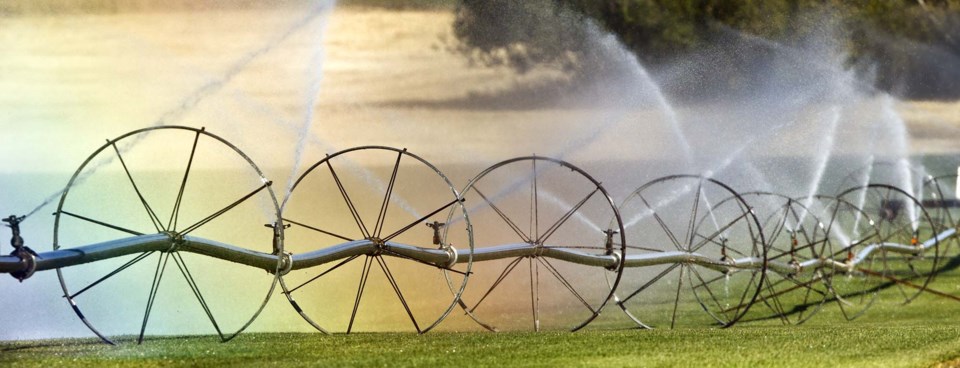St. Albert residents could be fined $100 for watering their lawns on a December afternoon under proposed changes to the city’s water conservation bylaw.
The St. Albert Environmental Advisory Committee (EAC) recommended changes to the city’s water conservation bylaw at its March 23 meeting.
Passed in 2015 and in effect since 2018, the bylaw aims to reduce water use in St. Albert by banning the use of municipal water to irrigate lawns, gardens, shrubs, and trees at certain times of the year and by requiring people to install low-flow plumbing fixtures when doing new construction or renovations.
The bylaw was one of several factors which may have helped the city reduce its water use in recent years. Per capita water use in St. Albert fell about 16 per cent between 2018 and 2022 and by about 30 per cent between 2009 and 2022, data from the city’s StATracker website suggests. (Weather and other factors make it difficult to attribute these changes to any one factor.)
Tougher, with teeth
The current water conservation bylaw bans people from watering their lawns, gardens, flowerbeds, shrubs, and trees any time except between 7 p.m. and 9 a.m. in order to minimize water losses to evaporation. The ban is currently in effect between May 1 to Oct. 31.
The committee recommended council remove the May 1-Oct. 31 reference to make this ban year-round.
City of St. Albert environment co-ordinator Payton Homeak said St. Albert’s seasons are shifting due to climate warming, and lawn watering may someday happen outside the typical May-October period. Administration suggested removing this date reference from the bylaw to account for these shifts.
The revised bylaw would still let residents use drip irrigation, watering cans, hoses with nozzles, recreational sprinklers, and water toys at any time. Residents could also water fresh-laid sod until the first cut or plants at risk of dying from drought.
The committee also recommended adding language to the bylaw to let the city’s chief administrative officer implement water demand management measures. The CAO can impose such measures already, but these additions give the CAO the power to enforce those measures with fines, explained city environment manager Meghan Myers.
Speaking to the committee, Homeak said these revisions would let the CAO impose different levels of water restrictions based on the amount of water in local reservoirs. When water reserves dipped to 65 per cent, the CAO could order city departments to halt non-essential water use such as hydrant flushing. At 50 per cent, the CAO could call on the public to restrict non-essential use. At 35 per cent, the CAO could ban non-essential water use in the city and enforce the ban with fines.
“With climate change, I’m sure this will be more common,” Homeak said of these water demand measures.
The committee recommended increasing the fine for violating the water conservation bylaw to $100 from $25, which was the same fine set out by the city’s idle-free bylaw. (The city has issued 16 warnings and zero fines under this bylaw since it came into force, city spokesperson Nicole Lynch said in an email.)
EAC chair Bill Marsh noted that administration may need to update the bylaw’s definitions of low-flow plumbing fixtures due to upcoming revisions to the national plumbing code.
Coun. Mike Killick said he hoped recent trends in severe weather would encourage people to conserve more water.
“It’s a scarce commodity and we shouldn’t be wasting it.”
Myers said the proposed revisions would go before council sometime this spring.
The proposed revisions can be viewed in the minutes of the March 23 EAC meeting.




